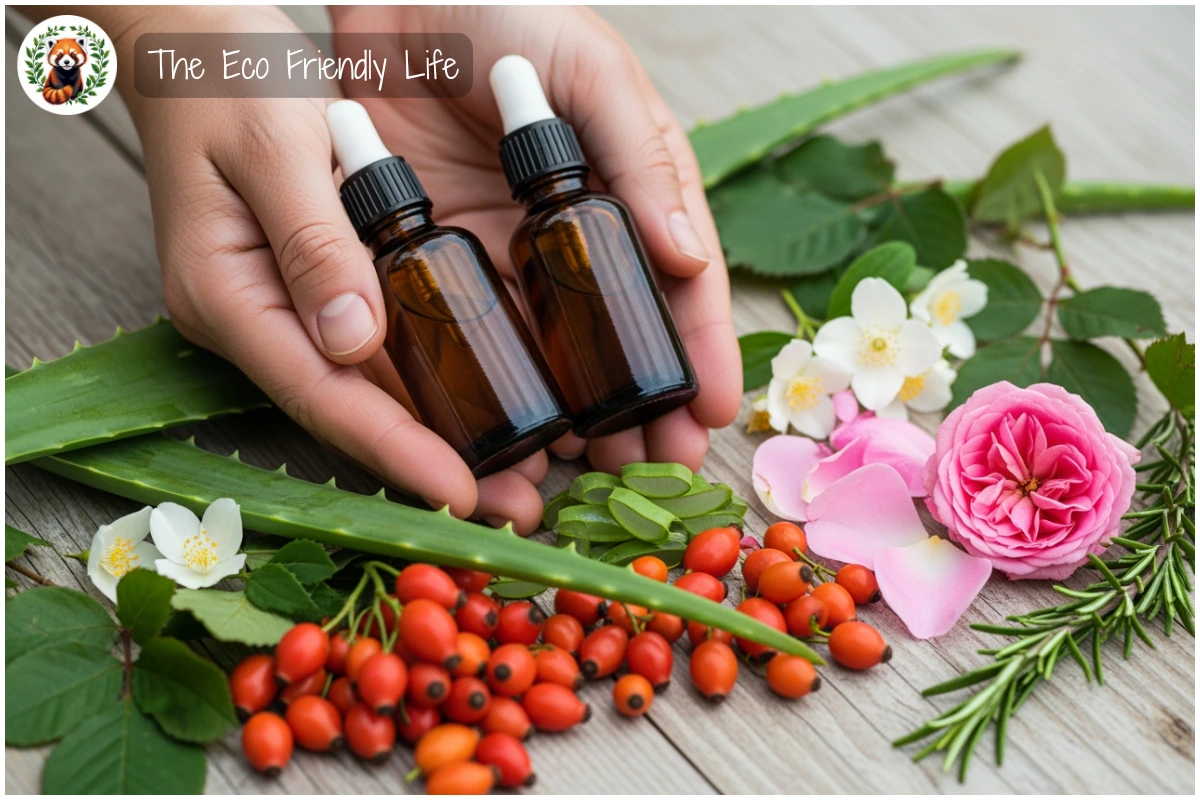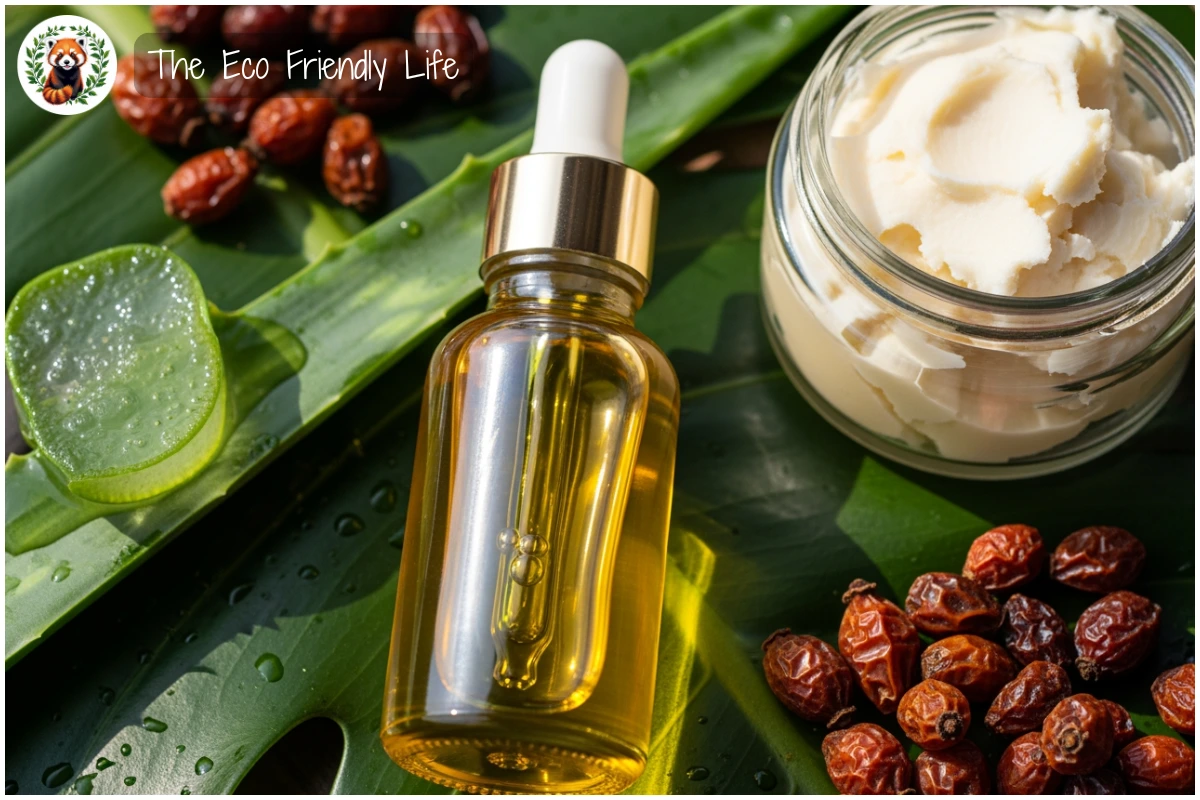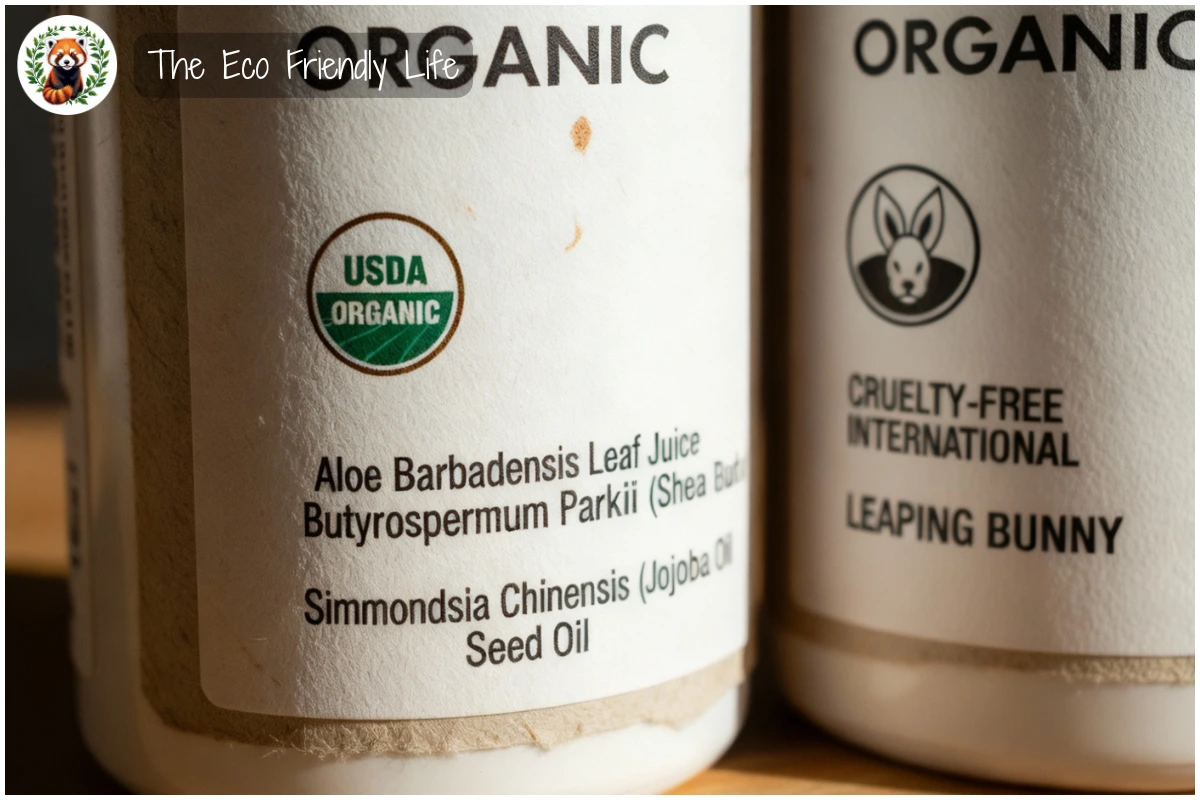The beauty and skincare world has witnessed a remarkable transformation in recent years, with more people seeking products that nourish their skin while respecting the environment. Organic skincare represents a return to nature’s wisdom, harnessing botanicals, minerals and plant-based ingredients to care for our skin without harsh synthetic chemicals. Unlike conventional products that may contain parabens, sulfates and artificial fragrances, organic skincare focuses on ingredients you can actually recognize and trust.
I’m Al, and I’ve spent years exploring the intersection of natural health and everyday wellness. Through this journey, I’ve discovered that what we put on our skin matters just as much as what we put in our bodies. Whether you’re dealing with sensitive skin, concerned about environmental impact, or simply curious about cleaner beauty options, organic skincare offers a compelling alternative to conventional products. Let’s dive into the essentials of organic skincare and discover how these natural ingredients can transform your daily routine.
Understanding What Makes Skincare Truly Organic
Defining Organic vs. Natural: While the terms “organic” and “natural” are often used interchangeably, they carry distinct meanings in the skincare world. Organic skincare products contain ingredients grown without synthetic pesticides, herbicides, genetically modified organisms or chemical fertilizers. The Australian Certified Organic requires at least 95% certified organic ingredients to carry the organic label, while the international COSMOS certification follows similar standards with rigorous requirements for ingredients, manufacturing and sustainability.
Certification Standards Matter: Understanding certification helps you identify genuine organic products. COSMOS certification, created by five European certification bodies, represents the leading international standard for natural and organic cosmetics. Products certified under these rigorous standards undergo thorough assessment of ingredients, manufacturing processes and environmental management. Other recognized certifications include the USDA National Organic Program for cosmetics and region-specific standards like the Australian National Standard for Organic and Bio-Dynamic Produce.
The Transparency Factor: Authentic organic skincare brands embrace transparency, clearly listing ingredients and their sources. When reading labels, organic ingredients often appear with their botanical names followed by the word “organic” or an asterisk indicating organic certification. Products with INCI (International Nomenclature of Cosmetic Ingredients) listings help consumers understand exactly what they’re applying to their skin, though the scientific names can sometimes seem complex.

The shift toward organic skincare represents more than a trend—it’s a conscious choice about health and environmental stewardship. As consumers become more ingredient-savvy, the demand for authentic, certified organic products continues to grow, pushing the industry toward greater accountability and transparency. Understanding these fundamentals prepares you to explore the powerful natural ingredients at the heart of organic formulations.
Key Organic Ingredients and Their Skin Benefits
Aloe Vera – Nature’s Soother: This succulent plant stands as one of skincare’s most versatile ingredients, with 95% water content and a remarkable array of vitamins and minerals. Aloe vera increases collagen production in fibroblasts, creating the proteins that keep skin elastic and youthful. Its mucopolysaccharides bind moisture into the skin, creating a reservoir that prevents transepidermal water loss. The plant’s anti-inflammatory properties help calm irritated skin, making it particularly beneficial for conditions like eczema, psoriasis and sunburn.
Hyaluronic Acid – The Moisture Magnet: Despite its scientific-sounding name, hyaluronic acid occurs naturally throughout the human body. This powerful humectant is capable of binding over one thousand times its weight in water, making it exceptional for hydration. While our bodies produce hyaluronic acid naturally, levels decline with age, contributing to fine lines and reduced skin elasticity. When applied topically, it draws moisture to the skin’s surface, providing immediate plumping effects while improving skin texture and smoothness. Many organic formulations now use plant-derived hyaluronic acid created through biofermentation of corn or other vegetables, offering a cruelty-free alternative to traditional animal-derived sources.
Vitamin C – Antioxidant Powerhouse: Found naturally in citrus fruits, rosehips and many botanicals, vitamin C functions as a potent antioxidant that neutralizes free radicals from pollution and UV exposure. This essential nutrient supports collagen production, helping maintain skin firmness and elasticity. In clinical trials, the majority of participants applying topical vitamin C had improvement in their dark spots with very little irritation. When combined with vitamin E, its effectiveness increases significantly, providing enhanced protection against environmental stressors.
Jojoba Oil – The Skin Balancer: This golden liquid extracted from jojoba plant nuts possesses a unique molecular structure remarkably similar to human sebum. Because of this similarity, jojoba oil helps regulate sebum production rather than adding excess oil to the skin. Rich in vitamin E, copper and zinc, it supports wound healing and collagen formation. Its non-comedogenic nature means it won’t clog pores, making it suitable for all skin types from dry to oily.
Shea Butter – Deep Nourishment: Extracted from the nuts of African shea trees, this creamy butter contains vitamins A, E and F along with essential fatty acids. Shea butter’s rich emollient properties help lock moisture onto the skin’s surface while its anti-inflammatory compounds soothe redness and irritation. Despite its richness, it absorbs well without leaving a greasy residue, making it valuable for both dry and oily skin types.
Rosehip Oil – Regeneration Specialist: Pressed from the seeds of wild rose bushes, rosehip oil is rich in retinoids that help replace old skin cells with new ones and stimulate collagen production. The oil’s essential fatty acids—including linoleic and alpha-linoleic acids—support the skin’s renewal process, reducing the appearance of scars, stretch marks and fine lines while improving overall skin texture.

These foundational ingredients demonstrate how nature provides comprehensive solutions for skin health. Each offers unique benefits while working synergistically when combined in thoughtful formulations. Beyond the ingredients themselves, choosing organic versions of these botanicals brings additional advantages for both personal health and planetary wellbeing.
The Environmental and Health Benefits of Choosing Organic
Reducing Chemical Exposure: Conventional skincare products often contain synthetic parabens, phthalates and sulfates that have raised health concerns. Parabens can disrupt hormones, while sulfates like sodium lauryl sulfate can cause skin irritation and dryness. Organic skincare eliminates these potentially harmful ingredients, reducing your body’s toxic load. This becomes particularly important when you consider that many people use multiple skincare and personal care products daily, creating cumulative exposure to synthetic chemicals.
Supporting Sustainable Agriculture: Organic farming practices protect soil health, promote biodiversity and avoid contaminating waterways with chemical runoff. Unlike conventional agriculture that relies on synthetic pesticides and fertilizers, organic farming uses natural methods like crop rotation, composting and biological pest control. These practices result in ingredients with higher nutrient density compared to conventionally grown plants. When you choose organic skincare, you’re supporting agricultural systems that work with nature rather than against it.
Protecting Aquatic Ecosystems: Many synthetic skincare ingredients don’t break down easily in the environment. Chemicals like parabens and microplastics can leach into waterways, affecting aquatic life and accumulating in ecosystems. Natural ingredients used in organic skincare tend to be biodegradable, breaking down more quickly without leaving harmful residues. This consideration extends to packaging choices, with many organic brands prioritizing recyclable, biodegradable or reusable containers.
Gentler on Sensitive Skin: Without harsh chemicals, synthetic fragrances and artificial preservatives, organic skincare reduces the risk of allergic reactions and skin irritation. People with conditions like eczema, rosacea or dermatitis often find organic products more compatible with their sensitive skin. The absence of synthetic drying agents and irritants means organic formulations can actually help strengthen the skin’s natural barrier rather than compromising it.
Higher Concentration of Active Ingredients: Organic skincare formulations often prioritize active botanical ingredients over synthetic fillers. Without excessive fillers and synthetic compounds, more of what you’re paying for actually benefits your skin. This concentration means you often need less product per application, making organic options more economical than they initially appear.

Making the switch to organic skincare extends beyond personal benefits—it’s a vote for environmental health and sustainable practices. Each purchase supports systems that prioritize long-term ecological balance over short-term convenience. For those ready to make this transition, finding retailers committed to these same values makes the journey more accessible and rewarding.
Retailers That Support the Planet – Our Product Recommendations
When transitioning to organic skincare, finding reliable retailers who share your values makes the journey easier. We’ve identified two exceptional companies that demonstrate genuine commitment to organic ingredients, environmental sustainability and product quality.
Our Retailer Recommendation for Adults
Green People – Certified Organic Skincare for Adults
Green People began when founder Charlotte Vøhtz sought natural solutions for her daughter’s eczema. Today, this UK-based company stands as one of the leading names in certified organic beauty. All their products are vegan, cruelty-free and suitable for sensitive skin, with formulations that never include SLS, parabens or synthetic fragrances. Their Scent Free Facial Sun Cream SPF30 exemplifies their commitment to effective, organic protection—offering broad-spectrum mineral-based UV defense with certified organic ingredients like aloe vera, edelweiss and cocoa butter. This makes it ideal for anyone seeking genuine organic sun protection without chemical filters. You can explore their full range of certified organic skincare products online.
Our Retailer Recommendation for Kids/Families
Earth Baby – Natural Care for Little Ones
Earth Baby Store specializes in certified organic and natural baby care products that prioritize both effectiveness and safety. Their formulations use gentle, plant-based ingredients suitable for the most delicate skin. The Shampoo + Body Wash features their award-winning OleoSphere Technology, which creates an advanced delivery system that protects the baby’s skin barrier while releasing nutrient-rich ingredients throughout the day. Made with certified organic ingredients like chamomile extract and naturally moisturizing botanicals, it provides tear-free, pH-balanced cleansing that parents trust and babies enjoy.
Both retailers demonstrate that choosing organic doesn’t mean compromising on quality or effectiveness. Their products prove that plant-based formulations can deliver outstanding results while respecting both skin health and environmental sustainability. Once you’ve found trusted organic products, understanding how to read labels and verify quality becomes the next essential step in your organic skincare journey.
How to Read and Understand Organic Skincare Labels
Decoding Ingredient Lists: Skincare labels list ingredients in descending order of concentration, meaning the first five ingredients typically constitute the majority of the product. If your desired active ingredient appears near the bottom, the product likely contains insufficient amounts to be effective. Pay attention to whether key ingredients appear before or after preservatives and fragrances, which are often present in small amounts.
Understanding INCI Names: Many natural ingredients appear under their scientific names on labels. Vitamin C might be listed as “ascorbic acid” or “tetrahexyldecyl ascorbate,” while hyaluronic acid often appears as “sodium hyaluronate.” Learning common scientific names helps you identify valuable ingredients hiding behind complex terminology. Some brands helpfully include common names in brackets to make labels more accessible.
Recognizing Certification Seals: Look for official certification logos from bodies like COSMOS, USDA Organic, Australian Certified Organic, or Soil Association. These seals indicate the product has met strict standards for organic content, sustainable sourcing and manufacturing practices. Be wary of products claiming to be “natural” or “organic” without third-party certification, as these terms aren’t regulated in many countries and can be misleading.
Identifying Ingredients to Avoid: Even when shopping for organic products, familiarize yourself with synthetic chemicals commonly found in conventional skincare. Watch for methylparaben, propylparaben, butylparaben, sodium lauryl sulfate, and phthalates. While truly organic certified products shouldn’t contain these substances, understanding what to avoid helps when evaluating products making organic claims without certification.
Checking Period After Opening Symbols: The PAO symbol—an open jar with a number inside—indicates how many months a product remains safe after opening. Organic products typically have shorter shelf lives than conventional ones, usually 6-12 months after opening, because they lack synthetic preservatives. Always note when you open a product and adhere to these guidelines for safety and effectiveness.

Becoming label-savvy empowers you to make informed choices. While it takes practice to navigate ingredient lists confidently, this knowledge ensures you’re truly getting the organic, natural products you’re seeking. Armed with this understanding, you’re ready to implement practical steps that bring organic skincare seamlessly into your everyday life.
Practical Daily Tips You Can Action Today
Here are actionable steps to incorporate organic skincare principles into your daily routine:
| Start with one product | Replace your most-used item (like moisturizer) with an organic version first. | Allows your skin to adjust gradually and helps you assess benefits without overwhelming changes. |
| Patch test new products | Apply a small amount to your inner arm for 24-48 hours before facial use. | Prevents potential reactions and helps identify any sensitivities to natural ingredients. |
| Store products properly | Keep organic skincare in cool, dark places away from humidity and direct sunlight. | Extends shelf life and preserves the potency of natural active ingredients. |
| Use clean application tools | Apply creams with spatulas instead of fingers, keeping containers tightly sealed. | Reduces bacterial contamination and helps products last longer without synthetic preservatives. |
| Check expiration dates | Note when you open products and follow PAO guidelines, typically using within 6-12 months. | Ensures product safety and effectiveness, particularly important for preservative-free formulas. |
| Read labels carefully | Look for certification seals and high percentages of organic ingredients near the top of lists. | Helps identify genuinely organic products and avoid greenwashing. |
| Support sustainable brands | Choose companies with transparent sourcing, eco-friendly packaging and ethical practices. | Amplifies your positive environmental impact beyond just the product ingredients. |
| Simplify your routine | Use multi-purpose organic products that serve several functions. | Reduces exposure to multiple ingredient combinations and saves money while being more sustainable. |
| Join online communities | Connect with others exploring organic skincare to share experiences and recommendations. | Provides support, discovers new products and learns from others’ successes and challenges. |
| Document your journey | Keep notes on products tried, reactions observed and improvements noticed over time. | Helps identify what works best for your unique skin and guides future purchasing decisions. |
Small consistent changes create lasting transformation. By implementing even a few of these tips, you’ll develop a more mindful, effective organic skincare routine that serves both your skin and the planet. As you build your routine, questions naturally arise—let’s address some of the most common ones.
FAQs
Is organic skincare more expensive than conventional products?
While organic skincare can have higher upfront costs, the concentration of active ingredients means you often use less per application. Additionally, by avoiding harsh chemicals, you may reduce the need for corrective treatments later, making organic options cost-effective over time.
How long does it take to see results from organic skincare?
Natural ingredients typically work more gently than synthetic alternatives, so visible results may take 4-8 weeks of consistent use. However, many people notice improvements in skin texture and hydration within the first few weeks.
Can organic skincare address specific concerns like acne or aging?
Absolutely. Many organic ingredients like tea tree oil, salicylic acid from willow bark, vitamin C and retinol from rosehip oil effectively target specific concerns. The key is finding certified organic products formulated for your particular needs.
Will organic products work for my skin type?
Organic skincare suits all skin types when properly formulated. Those with oily skin benefit from non-comedogenic oils like jojoba, while dry skin responds well to shea butter and aloe vera. Sensitive skin often thrives with organic products due to the absence of harsh synthetic irritants.
Organizations to Support – Our Recommendations
Making a difference extends beyond personal choices. These organizations work globally to promote sustainable beauty practices and protect our environment:
- The Green Beauty Community Foundation – This nonprofit organization connects individuals and brands passionate about sustainable beauty practices. They provide education, resources and community support to make sustainable beauty the new standard. Support their mission to transform the beauty industry through their donation page.
- Environmental Working Group (EWG) – An independent nonprofit dedicated to protecting human health from harmful substances in personal care products. Their Skin Deep database helps consumers identify safer products while they lobby for policy reform. Contribute to their research and advocacy efforts through their support page.
- 1% For The Planet – This global organization connects businesses and individuals who commit at least 1% of annual revenue to environmental causes. Many organic skincare companies partner with this organization, meaning your purchases from participating brands directly support vetted environmental nonprofits. Learn more about their network and how to support their mission.
Supporting these organizations amplifies your impact, creating systemic change that extends far beyond individual purchasing decisions.
Resources and Further Reading
Deepen your understanding of organic skincare with these expert resources:
- COSMOS Standard Official Website – Access comprehensive information about international organic and natural cosmetics certification standards, including detailed requirements and approved certifier listings at cosmos-standard.org.
- Environmental Working Group’s Skin Deep Database – Search over 100,000 products to understand ingredient safety, potential health concerns and compare organic alternatives at EWG’s Skin Deep.
- Australian Certified Organic – Learn about organic certification standards in Australia and access their directory of certified products and ingredients through their cosmetics certification page.
These resources provide scientifically-backed information to guide your organic skincare journey with confidence and clarity.
Our Related Articles

Understanding Natural Approaches To Health And Beauty
In today’s world, the conversation around health and beauty has shifted dramatically. Rather than chasing quick fixes or unproven trends, people worldwide are rediscovering what…
Read More
What Does It Mean To Live A Green Lifestyle?
A green lifestyle represents a conscious commitment to making daily choices that minimize environmental harm and promote the health of our planet. Living sustainably means…
Read MoreConclusion
Organic skincare represents more than a beauty trend—it’s a holistic approach to skin health that honors both our bodies and the planet. By choosing products with certified organic ingredients, you’re reducing exposure to synthetic chemicals, supporting sustainable agriculture and embracing formulations rich in nutrients that truly nourish your skin. The journey to organic skincare doesn’t require perfection or overnight transformation. Start with one product, read labels carefully, and listen to your skin’s response. Whether you’re drawn to the environmental benefits, concerned about synthetic chemicals, or simply seeking more effective skincare, organic options offer a compelling path forward.
Remember that your skin is unique, and finding the right organic products may involve some experimentation. Be patient with the process, and celebrate the small victories along the way. As you discover which ingredients and formulations work best for you, you’ll develop a deeper connection with your skincare routine and a greater appreciation for nature’s remarkable ability to heal and nourish.
What’s been your biggest challenge or success in switching to organic skincare? Have you discovered any particular ingredients that transformed your skin? Share your experiences and questions in the comments below—your insights might help someone else on their organic skincare journey!


